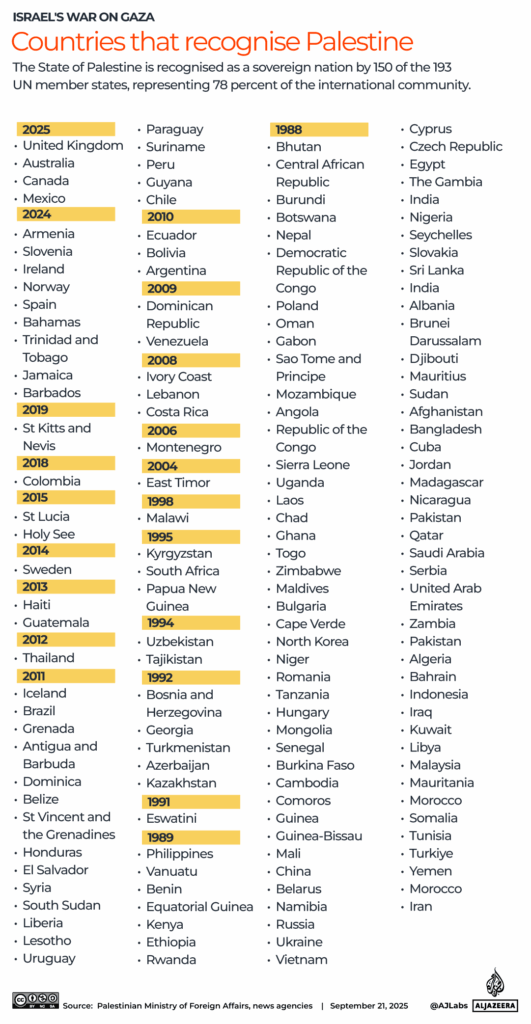Canada and Australia have joined the United Kingdom in formally recognising Palestinian statehood as Israel plans to expand settlements in the occupied West Bank and intensifies its war on Gaza.
In a statement on Sunday, Canadian Prime Minister Mark Carney announced the recognition of a Palestinian state and offered “our partnership in building the promise of a peaceful future for both the State of Palestine and the State of Israel”.
Recommended Stories
list of 3 itemsend of list
Carney added that the Israeli government was working “methodically to prevent the prospect of a Palestinian state from ever being established”.
“Recognising the State of Palestine, led by the Palestinian Authority, empowers those who seek peaceful coexistence and the end of Hamas. This in no way legitimises terrorism, nor is it any reward for it,” Carney said.
He added that the Palestinian Authority provided “direct commitments” to Canada on reforming its governance; holding general elections next year, which Hamas “can play no part” in; and demilitarising the Palestinian state.
At the same time, Australia announced that it was also recognising Palestinian statehood.
In a statement by Prime Minister Anthony Albanese, Australia said its recognition alongside Canada’s and the UK’s was part of an international effort for a two-state solution.
Albanese said in a joint statement with Foreign Minister Penny Wong that the decision was meant to revive momentum for a two-state solution that begins with a ceasefire in Gaza and the release of captives held in Gaza.
But the statement reiterated that Hamas must have “no role in Palestine”.
Canada’s and Australia’s recognition of Palestinian statehood was coordinated with the UK, where Prime Minister Keir Starmer announced that his country was formally recognising a Palestinian state shortly after the announcements from Ottawa and Canberra.
Starmer said recognition would “revive hope for peace for the Palestinians and Israelis and a two-state solution”.
However, the announcements from major Western powers – and longtime Israeli allies – indicated that Israel is growing increasingly isolated internationally in light of its war on Gaza, where it has killed more than 65,200 Palestinians.
Israel and the United States have repeatedly said recognising Palestinian statehood in the midst of the war in Gaza would be a “reward” for Hamas.
Israeli Prime Minister Benjamin Netanyahu reiterated that message in his reaction to Sunday’s recognition of Palestine, saying that it was a “prize” for Hamas.
He added that a Palestinian state “will not happen”.
At the United Nations General Assembly in New York next week, more countries have pledged to recognise Palestine, including France.
While recognition of Palestinian statehood is largely symbolic and has little influence on Israeli actions in the occupied territory, it highlights growing international support for Palestine.
So far, 147 of the 193 UN member states have recognised Palestinian statehood.
But that recognition still does not give Palestine an official seat at the UN, which can only be approved by the Security Council.
The US, a permanent member of the Security Council with veto power, has already rejected calls for recognition at this moment.
But in the US as well as other Western countries, domestic pressure to back the Palestinian cause is strengthening.
Alongside recognition of Palestinian statehood, a number of Western states have imposed sanctions on Israel or are threatening to do so.
And in the past few weeks, the Netherlands, Spain, Ireland and others have pledged to boycott the European Song Contest if Israel is allowed to participate in next year’s event.
The international chorus against Israel has been acknowledged by Netanyahu, who said last week that his country was “in a sort of isolation” and would need to adapt its economy accordingly.
